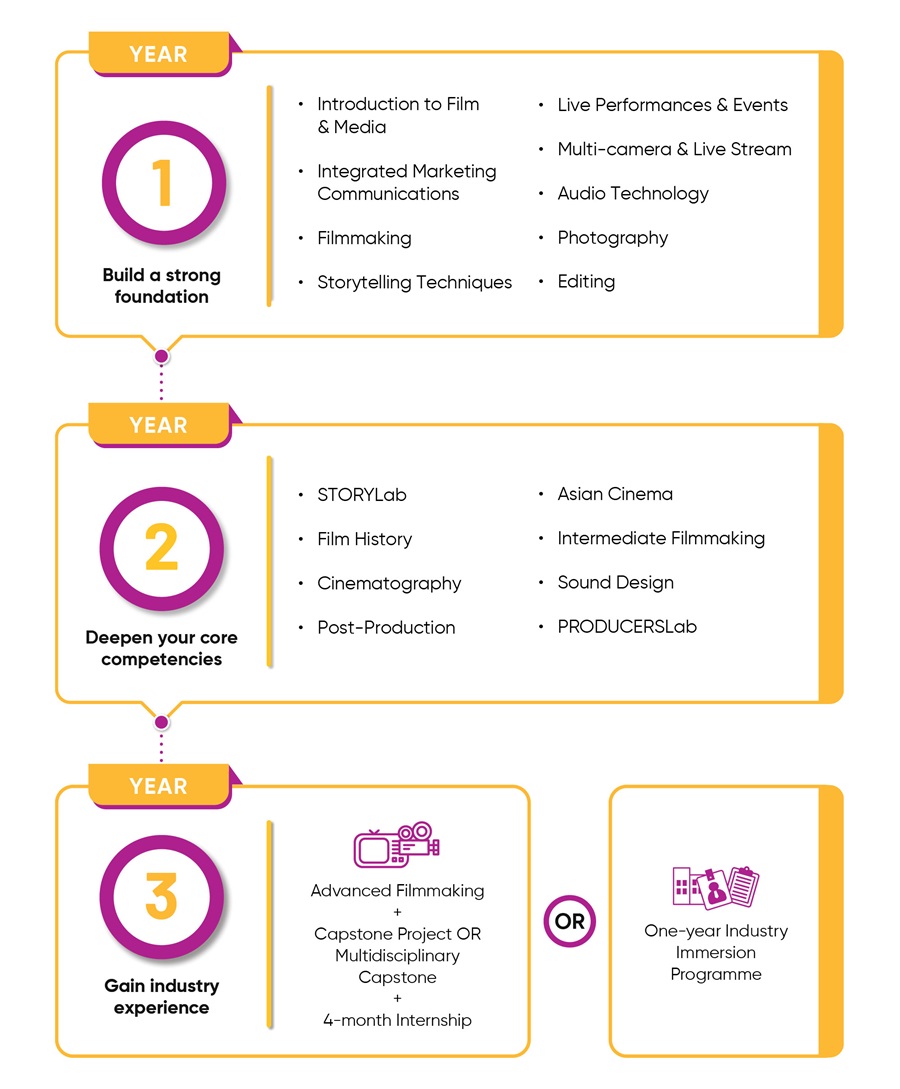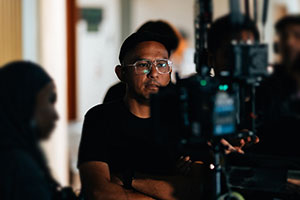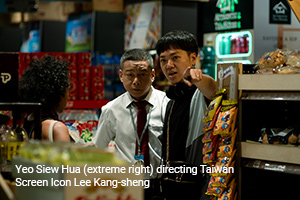Why FSV?
- Pay homage to the art of filmmaking — and embrace the future of content creation — at Singapore’s most established filmmaking course.
- Join the ranks of our award-winning alumni and lecturers, whose works have captivated audiences on international screens and streaming platforms.
- Be inspired through the CREATORLab Programme, where you’ll collaborate with filmmakers, storytellers, and creators to develop original content across multiple platforms — from film and streaming to social and digital-first media. This is where creativity meets innovation, and stories find their voice in every format.
- Learn and create in state-of-the-art facilities — from professional sound stages and edit suites to fully equipped livestream studios — as you build a portfolio that bridges cinematic storytelling and the creator economy.
About FSV
Step into the future of storytelling with The CREATORLab Programme, a distinctive second-year experience that empowers you to create, produce and pilot original content across multiple platforms.
Through its two signature modules — STORYLab and PRODUCERSLab — you’ll learn to craft stories that travel beyond the screen, blending creativity, strategy and audience insight. Develop both fictional
and factual projects designed for different formats, from short films and series to social and digital-first media.
In STORYLab, you’ll experiment boldly with ideas and forms, mastering the art of narrative design for today’s multi-platform audience. In PRODUCERSLab, you’ll take on the role of a creative producer
— managing rights, budgets, schedules and analytics to bring your vision from concept to market.
By merging artistic exploration with professional practice, the CREATORLab Programme equips you with the mindset and skillset to thrive as both storyteller and producer in the evolving creator economy for Every Screen, Everywhere!
At FSV, you will build a strong foundation in both the artistic and technical aspects of filmmaking. Hone your skills in areas like scriptwriting, sound, cinematography, motion graphics and post-production. You will also get to build your theoretical
foundation by learning from the masters of cinema in our cinema studies classes.
Sharpen your technical skills through hands-on exposure to the latest industry-standard equipment, including HD digital cameras and established post-production
tools such as Premiere Pro, ProTools and DaVinci Resolve. Plus, you will have access to top-notch facilities such as a film sound stage and a full HD television studio.
FSV graduates have been hired for exciting projects in the local and overseas film and media industry, such as Ah Boys to Men and Stranger Eyes – the first Singaporean film to compete for the Golden Lion at the Venice Film Festival – to wide release films such as Crazy Rich Asians and Star Wars: The Last Jedi.
Design Your Own FSV Journey

Further Studies
You will enjoy advanced standing for degree programmes at top film and media schools, both locally and abroad. Many FSV graduates have also received scholarships and bursaries from the National Arts Council, Singapore Film Commission and the Infocomm Media Development Authority to pursue further studies at National University of Singapore, Nanyang Technological University, Stanford University (US), University of Cambridge and the National Film & Television School (UK).
Careers
Your portfolio, experience and skills pave the way for you to carve out your own career path in the film and media industry. Or you can use the skills you acquire to pursue careers in different fields. You can look forward to roles such as:
- Content Developer
- Content Strategist
- Cinematographer
- Director
- Editor
- Gaffer
- Location Manager
- Location Sound Recordist
- Motion Graphics Designer
- Post-Production Supervisor
- Producer
- Production Designer
- Production Manager
- Social Media Content Producer
- Sound Designer
- Scriptwriter
Entry Requirements
AGGREGATE TYPE ELR2B2-A
To be eligible for consideration, candidates must have the following GCE ‘O’ Level examination (or equivalent) results.
| Subject | 'O' Level Grade |
|---|---|
| English Language | 1-6 |
| Additional Mathematics/Mathematics | 1-7 |
| Any one of the 1st group of Relevant Subjects for the ELR2B2-A Aggregate Type | 1-6 |
Applicants must also fulfil the aggregate computation requirements for the ELR2B2-A Aggregate Type ( English Language, 2 relevant subjects and 2 other best subjects) listed at www.np.edu.sg/docs/ELR2B2.pdf .
For students with other qualifications, please refer to the NP website for the entry requirements and admissions exercise period.
Candidates with severe vision or hearing deficiency may encounter difficulties meeting the course requirements and expectations. Those with colour vision deficiency are required to declare this condition at enrolment, as certain modules require colour recognition.
What You Will Learn
Introduction to Film & Media (4 Credit Units)
This module examines multi-platform content and the digital platforms and technologies by which the content is delivered (virtual conferences, streaming, blogs, social media, online videos, immersive experiences). Students will appreciate and analyse a variety of media with different perspectives based on multiple platforms to reach an audience. By the end of the module, students will become more literate “producers” and critics of multi-platform media today.
Integrated Marketing Communications (4 Credit Units)
This module introduces students to the basic principles and concepts of marketing communications, with an emphasis on promotion in marketing. Students will learn about marketing and how its promotional elements must be integrated to communicate effectively. Students will apply basic skills in research and market analysis to plan and develop a marketing communications campaign.
Filmmaking (4 Credit Units)
This foundation module introduces students to the principles and practices of filmmaking. Through hands-on training, students will engage in pre-production planning, single-camera cinematography, location lighting, grip work, sound recording, and non-linear editing. Emphasis is placed on visual storytelling and the integration of sound and image to create coherent and engaging screen content. By the end of the module, students will have developed both technical competence and creative awareness in the craft of filmmaking
Storytelling Techniques (3 Credit Units)
This module scaffolds and synthesises storytelling, functional writing, and research techniques, to create engaging multi-platform content. Through the module, students will be taught the tools to effectively ideate compelling story and content ideas
and efficiently craft considered and professional written treatments and proposals, with which to present their content and engage audiences across media platforms.
Live Performances & Events (4 Credit Units)
This module introduces students to a variety of live performance and event formats, including theatre, concerts, conferences, and immersive experiential exhibitions. It offers a fundamental understanding of the production process, examining key roles, workflows, and planning considerations involved in staging live events. Students will gain knowledge through observation, case studies, and practical activities.
Career & Professional Preparation 1 (1 Credit Unit)
This module gives students a foundational introduction to their three-year diploma course curriculum and how it prepares them for industry. Through guided reflection of their personal characteristics and the development of an overall game plan for their
education and career goals, students will be better prepared for their future careers.
English Language Express* (Credit Units - NA)
English Language Express aims to give you a better grounding in the English Language and to strengthen the written and oral communications skills that you will need in your academic and professional careers. You will be engaged in writing, reading, listening
and speaking activities that will develop your ability to speak and write grammatically, coherently and clearly. You will also hone your reading and listening comprehension skills.
Health & Wellness^ (1 Credit Unit)
This is a Level 1 Core module for all Year 1 students. The module will introduce students to the importance of maintaining both physical and mental health through the knowledge and monitoring of health indicators, and application through appropriate exercises. The aim of the module is to empower students with basic knowledge and skills to be independent and responsible in maintaining overall personal health.
^ Critical Core modules account for 10 credit units of the diploma curriculum. They include modules in innovation and world issues, as well as an interdisciplinary project. By bringing students from diverse diplomas together, the interdisciplinary project fosters collaboration to explore and propose solutions for real-world problems. NP aims to develop students to be agile and self-directed learners, ready for the future workplace.
Multi-camera & Livestream (4 Credit Units)
This module equips students with the essential skills and techniques of multi-camera production across both studio and on-location environments. Students will learn how to capture multiple perspectives simultaneously and apply industry-standard workflows to produce content in diverse genres, from podcasts, talk shows, music, sports to live events and livestreaming.
Audio Technology (4 Credit Units)
Students are taught the knowledge and skills for audio production here. They will learn the basic principles and technical concepts of sound production and technology. Foundational production skills developed in recording, overdubbing, processing and mixing can be applied to produce audio for video, television, film, radio and music products.
Photography (3 Credit Units)
This module explores the technical and aesthetic aspects of still photography. Topics include the use of digital camera, exposure techniques, use of existing light, visual elements and principles of design in photography, concepts of composition, storytelling with pictures and photo-portfolio preparation.
Editing (3 Credit Units)
This module provides introductory knowledge in the area of post-production as well as hands-on editing experience. Students will learn the finer details of editing for a narrative-driven project. Through exercises and reflection, they will have many opportunities to become familiar with the various concepts of editing.
The VOICE module aims to empower students to become thoughtful and confident communicators able to tailor a message to suit audience, purpose and context. Students will learn how to use storytelling structures and techniques, persuasive strategies and effective visuals to connect meaningfully with their audience. Through a personalised growth plan, the module encourages students to reflect, set goals and take ownership of their growth and development as communicators. The module employs engaging teaching strategies such as games, thinking routines, masterclasses and workshops, and a celebratory showcase festival at the end to make learning fun and exciting.
Innovation Made Possible^ (3 Credit Units)
This module aims to help students discover and hone their innate ability to think creatively and come up with innovations to tackle problems close to their hearts. Underpinned by the Design Thinking framework, students will be sensitised to the process of user-centric problem solving. They will be introduced to concepts such as empathy, problem-definition, ideation, prototyping and testing through a practical approach featuring engaging out-of-classroom activities, just-in- time master-classes and a hands-on, “learning by doing” delivery format. Ultimately, the module will help students recognise that innovation is attainable and fun and develop creative confidence to explore new ideas in their studies and beyond.
^ Critical Core modules account for 10 credit units of the diploma curriculum. They include modules in innovation and world issues, as well as an interdisciplinary project. By bringing students from diverse diplomas together, the interdisciplinary project fosters collaboration to explore and propose solutions for real-world problems. NP aims to develop students to be agile and self-directed learners, ready for the future workplace.
STORYLab (7 Credit Units)
The module focuses on the creative heart of storytelling in the creator economy. Students individually develop two narrative projects — one fiction and one factual — designed for different platforms such as film, streaming, or social media. Emphasis is placed on narrative craft, originality, and adaptability, allowing students to experiment with both form and audience engagement. With guidance from industry fellows, students take their ideas from concept to prototype, producing a dual-platform storytelling portfolio that demonstrates creativity, versatility, and industry relevance.
Film History (4 Credit Units)
Film History is an introductory survey course that examines the social, technological and aesthetic history of filmmaking from the origins to the present. This course will emphasise critical, theoretical and historical perspectives in analysing film. Special attention will be placed on films and film movements outside the mainstream. The focus will be on the history of film from a Western perspective, primarily American and European.
Cinematography (4 Credit Units)
Students gain a better understanding of the aesthetics and craft of cinematography with special concentration on practice, workflow and safety at a professional standard. The module aims to take learning outside the classroom with tutor-guided masterclasses conducted in locations that are researched and sourced by the students. This makes for more dynamic and active learning that mimics real-world conditions.
Post Production (3 Credit Units)
This module provides an opportunity to create motion graphics in post-production for intermediate level students who have mastered the fundamental principles and skills of editing and video production. Students will build up their capacity to create contents
of motion graphics and train technical skills for post-production. Students will deal with the various concepts of motion graphics and workflows in post-production. This will help students prepare for their capstone projects in their final year.
World Issues: A Singapore Perspective^ (2 Credit Units)
This module will expose you to a wide range of global issues viewed and discussed in the context of Singapore as a nation state. You will be guided to critically examine current affairs from various perspectives and develop an appreciation of the dynamism behind real world problems and possible solutions. The intent of this module is to develop thinking students with well-considered perspectives who are able to articulate reasonable opinions, make thoughtful decisions and informed choices as active citizens in society. You will also be exposed to a multidisciplinary approach in the mitigation of global challenges and thus be adequately prepared to handle the Year 3 interdisciplinary project – Project ID.
^ Critical Core modules account for 10 credit units of the diploma curriculum. They include modules in innovation and world issues, as well as an interdisciplinary project. By bringing students from diverse diplomas together, the interdisciplinary project fosters collaboration to explore and propose solutions for real-world problems. NP aims to develop students to be agile and self-directed learners, ready for the future workplace.
PRODUCERSLab (7 Credit Units)
This module prepares students as creative producers who pilot and show-run projects from concept to screen. Working in groups, students research, plan, and develop platform-ready projects, learning to balance creative vision with business realities. The module equips them with producing skills in budgeting, rights management, scheduling, and stakeholder engagement, while integrating audience insights and analytics to ensure scalability and market relevance. Mentored by industry fellows, students gain hands-on experience in pitching, producing and piloting, emerging as producer-leaders capable of delivering market-ready content across platforms.
Asian Cinema (5 Credit Units)
The module introduces students to the art and business of Asian cinema. Students will explore the unique traditions of selected national cinemas of East-, South- and Southeast Asia. Against the backdrop of globalisation, they will also discover the unique histories and aesthetics of Asian film production.
Intermediate Filmmaking (4 Credit Units)
Building on the conventions learnt in first-year modules Location Filmmaking and Storytelling Techniques, students delve to examine the craft deeper and discover principles that make for an affective film. This class is exploratory in nature and students chart their own learning journey through guided filming projects and intimate group discussions.
Sound Design (3 Credit Units)
Students will learn the basic knowledge and skills needed for capturing good sound on location in support of sound design. They will also learn how Sound Design can be used to complement and enhance films with the use of foley, voiceover and ADR. With an introduction to ProTools, students will be able to produce basic sound tracks for short films through location sound recording, sound design, editing and mixing.
Career & Professional Preparation 2 (2 Credit Units)
This second-year module is designed to equip students with the necessary skills to seek and secure work, as well as communicate their personal brand. The module will help students better understand their course-related media sectors and equip them with the necessary skills – written, verbal and presentation – to market themselves effectively when pursuing a career in the media industry.
Advanced Filmmaking (8 Credit Units)
Building on skills acquired in their first two years of study, students complete two short films that allow them to hone their abilities in writing, cinematography, lighting, sound recording, editing and sound mixing. The students will develop a conceptual knowledge of different film styles and enhance their understanding and competence in issues related to content and storytelling. The "inclass" and "on location" assignments will emphasise the shooting procedure and working with actors on a set. Part of the class will be delivered in the masterclass method of instruction.
Capstone Project (10 Credit Units)
Using the conceptual and applied knowledge learnt in Year 1 and 2, students hone and integrate their skills through managing and operating the school’s flagship business units, working with external clients on real-time projects, working on their own projects in various disciplines and across disciplines or carrying out freelance engagements. All projects will provide students with hands-on experience in incorporating various skills, platforms and mechanisms to achieve the desired impact in the marketplace.
Industry Immersion Programme I (10 Credit Units)
Students who prefer more working experience can opt for this programme, allowing them to work for one year with our partner organisations such as Mediacorp, mm2 Entertainment and The Smart Local.
Project ID: Connecting The Dots^ (4 Credit Units)
^ Critical Core modules account for 10 credit units of the diploma curriculum. They include modules in innovation and world issues, as well as an interdisciplinary project. By bringing students from diverse diplomas together, the interdisciplinary project fosters collaboration to explore and propose solutions for real-world problems. NP aims to develop students to be agile and self-directed learners, ready for the future workplace.
Internship (Local/Overseas) (16 Credit Units)
Students will be placed on an internship with companies and agencies matching their abilities and interests. The internship gives students opportunities to apply their acquired knowledge and skills to the work environment. Students gain valuable work experience and exposure to the rigour, demands and excitement of the media industry, enabling them to adapt effectively to future employment. Many of our students are offered employment by these same companies.
Industry Immersion Programme II (16 Credit Units)
Students who prefer more working experience can opt for this programme, allowing them to work for one year with our partner organisations such as Mediacorp, mm2 Entertainment and The Smart Local.






